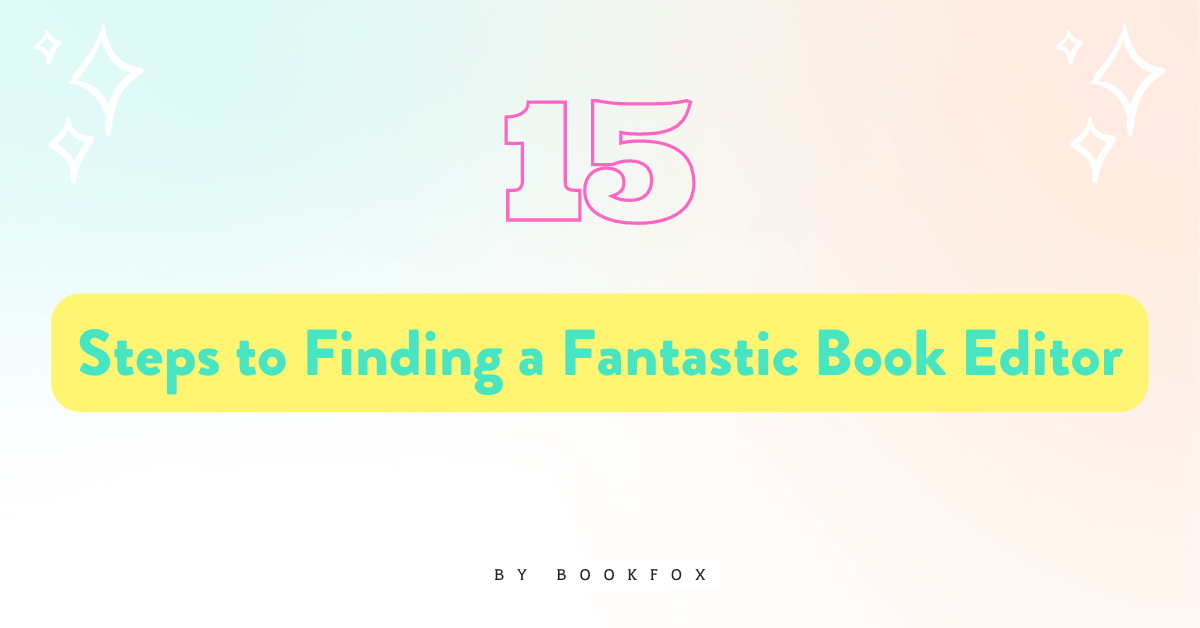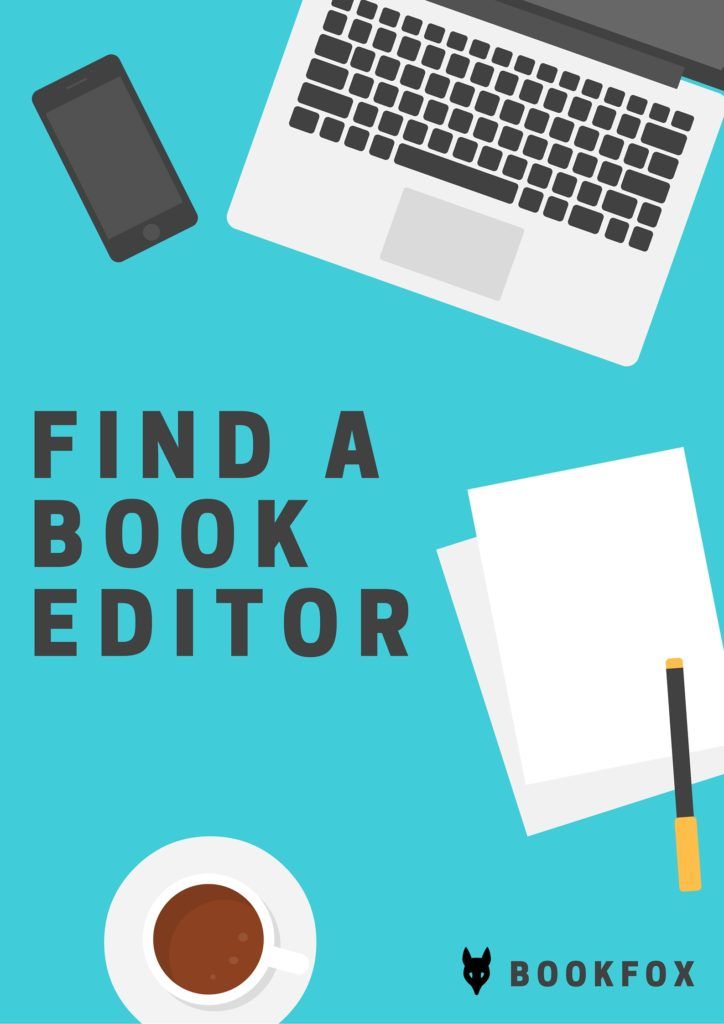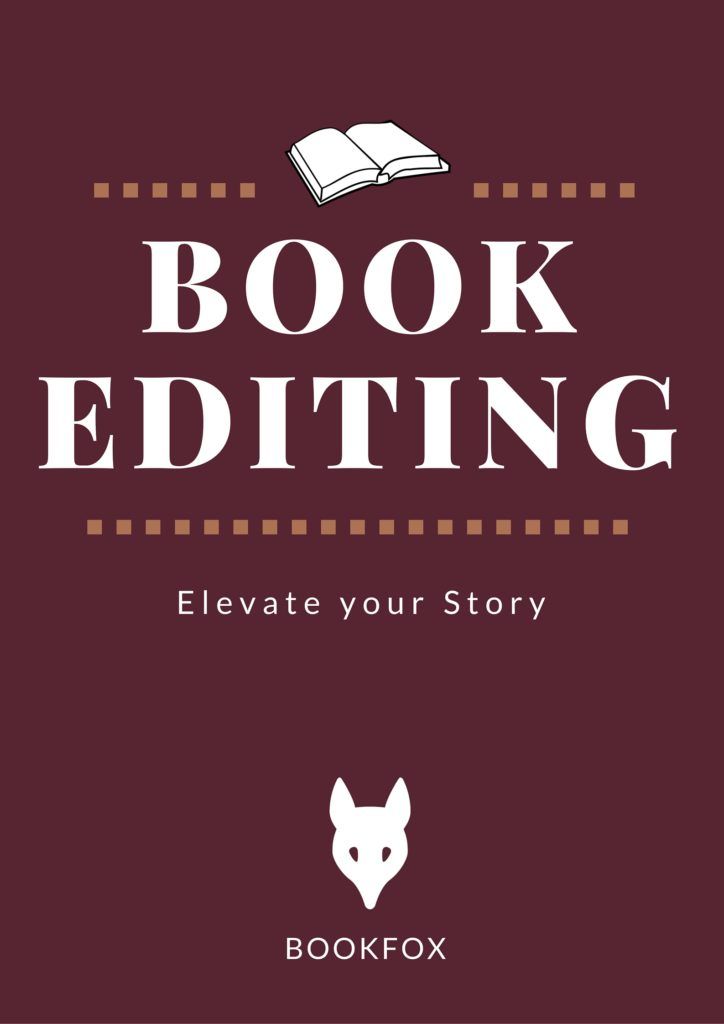
 1. Find A Book Editor in Creative Ways
1. Find A Book Editor in Creative Ways
Don’t just Google a book editor. You’re going to find the most famous editors that way, the ones swamped with clients and with a 3 or 4 month wait time. You’re also going to find the most expensive ones that way, and expensive doesn’t always translate to best.
Here are 4 alternative ways to find a book editor:
- Are you part of any Facebook writing groups? If not, join some, and then ask your new community for recommendations.
- Ask mid-level authors that you admire whether they also edit books. Sometimes you find out that they do, and it’s a dream to get personalized editing from an author you’ve read and enjoyed.
- Go to other community forums and ask for recommendations for professional book editors. NaNoWriMo, Goodreads, and any other online communities you belong to.
- Trust an editor/writer associated with a website you particularly enjoy (such as Bookfox!)
2. Play Detective
If you eat at a new restaurant, you check Yelp. If you hire a handyman, you get a recommendation or check Angie’s List. And when you hire a book editor, you check their history.
Preditors and Editors is an excellent resource for avoiding bad editors. You should try to find complaints against freelance book editors, including doing a Google search on your potential editor to see if any other writers have complained (or praised them! Glowing reviews are golden).
Send several emails back and forth to your book editor to see how they respond, and if they respond in a timely way to questions.
3. Determine Which Payment Style is Best for You
By the word?
Is your book editor charging by a set rate under a certain number of words? For instance, many freelance book editors will charge a set editing fee for books or novels under 80,000 words, or under 100,000 words. A maximum word count is best for the writer, unless they have a manuscript with a weird word count, such as a novella-length 50,000 words, that would make charging by the word a cheaper option. Editing rates per word vary between 1.5 cents a word up to 4 cents per word for developmental editing rates.
By the hour?
The going rate is about $50 an hour. The cheapest, depending on your location, might be $35 or $40, but buyer beware. A very good editor might charge up to $60 an hour. I’ve seen rates as high as $75 an hour, but this seems pretty high to me. Writer’s are generally wary of paying by the hour because they never know how much they will be charged. A set rate is easier for the writer to handle.
By the page?
Don’t be the punk who tries to enlarge margins and shrink font to get a smaller page count. It’s precisely this type of high school shenanigans that make most editors charge by the word rather than the page. If they do charge by the page, they will likely give a limit like 250 words max per page. (industry standard is 250 a page)
By a percentage of future sales?
This is rare. Usually writers dangle a promise of a royalty stake, and editors will refuse because 99% of the time, that money will never materialize. Ghostwriters sometimes ask for a royalty stake, but not freelance editors. It would be very strange to have a novel editor ask for this, and I would be wary. Unless the payment is very cheap, I would avoid this option.
4. Beware of Bad Editors
They make ridiculous and false claims:
- “You need professional editing before submitting to agents or editors.”
- You don’t need copy editing, but it sure helps to get developmental editing!
- “I can make your book a best seller!”
- Don’t be gullible — not even a genius editor can rewrite your book into a bestseller. If they could, they’d be writing bestsellers themselves.
- “It would be so much better if X happened!”
- They shouldn’t try to change your book into their book. A good editor pays attention to your voice and your story and tries to suggest changes that are in line with your vision.
- “I can edit 30 pages an hour.”
- A more realistic rate is 5 – 15 pages an hour, depending on whether it’s developmental and proofreading, or just proofreading.
5. Ask Your Editor These 14 Questions:
- Do you do the manuscript editing yourself, or do you subcontract it out to another editor?
- What do you love about editing?
- How many books have you edited before?
- How many books have you edited this year?
- What genres are your favorites?
- On a scale of one to ten, how harsh is your feedback?
- On a scale of one to ten, how often do you suggest clients make large-scale changes to their books?
- Do you have testimonials from former clients?
- What are your credentials? Do you have a Master’s degree in English or creative writing, or do you have experience in publishing?
- How many passes through the manuscript will you do?
- What style guide do you use? (Chicago Manual of Style?)
- Do you offer a contract?
- What’s your turnaround time?
6. Determine Your Stomach for Criticism
I can’t emphasize how important this is. This is probably the most critical part of a relationship between an editor and a writer, but many writers fail to ask about it.
In short, you want to hire a professional editor who will give you the amount and type of criticism you’re looking for.
For instance, some editors will offer a scorched earth approach where they tell you everything that’s wrong with your novel. If you have an endless appetite for revision and are kind of a masochist, then this type of fiction editing services will work for you. You will eat it all up and come back asking for more.
But if you want reassurance that you’re a good writer, and don’t want to do huge revisions, then select a more encouraging manuscript editor. Someone who will correct small things and tell you all the places where your book is succeeding.
Ask freelance editors where they fall on this spectrum, and tell your manuscript editor exactly what you’re looking for.
7. Hire Bookfox to Edit Your Book
 | If you’re appreciating this article, consider Bookfox for your book editing needs. I’ve been editing novels for more than a decade, and written 900 posts about writing and books here on Bookfox. You can find out more at my book editing page. |
8. Select What Editing You Need
Some editors do all the services below, and some specialize in only one or two. In order to pick the right book editor, you should know what editing services they provide.
The Four Major Editing Services (from biggest to smallest changes)
- Developmental editing (also called content editing) – editing for big-picture things like character development, plot, and pacing
- Line editing– editing sentences, word choice, deleting unnecessary sentences/paragraphs, improving voice and dialogue.
- Copyediting– editing for punctuation, spelling, grammar, and consistency
- Proofreading– editing for typos, missed grammar and spelling issues, and sometimes formatting
If you’re self-publishing, and don’t want to rewrite or revise in significant ways, you might only be interested in proofreading or copyediting.
If you’re seeking a publisher, or if you’re self-publishing and want to put out the best product possible, I would recommend developmental and line-editing.
9. Figure out Your Timeframe
How soon do you need this book edited?
In my experience, I always love quick feedback, and I chafe when forced to wait six months or longer to hear back on a project. By that time I’ve already moved onto the next project, and I don’t want to edit the last one!
Wait times for editors vary widely. Some are booked six months in advance, others can edit your book the next month, and some are available immediately.
10. Pick an Editor that Works with Your Genre
Don’t hire a literary editor who specializes in quiet domestic dramas for an apocalyptic novel about werewolves. Don’t hire a thriller editor when you write steamy romance.
Their suggestions will run totally counter to what you want your book to become.
Of course, this only matters for developmental editing. Line-editing, copy-editing, and proofreading all are genre-independent.
Also, pick a nonfiction editor if you’re writing nonfiction, and pick a fiction editor if you’re writing a novel. Lastly, if you’re writing a short story collection, you absolutely have to hire an editor who specializes in short story collections.
11. Get a Solid Contract
A contract is a great way to ensure you and the editor are on the same page, and provides both you and the editor with a recourse in case (God forbid) something goes terrible wrong.
These are some things you would like to see in a contract:
- A confidentiality clause. This bans them from publicly discussing or disparaging your manuscript, as well as barring them from distributing your manuscript.
- A date by which they will finish. This is a firm deadline, and it’s even better if the manuscript has a consequence for missing the deadline. A sign of a good book editor is if they are contact and tell you why they have to miss the deadline. A sign of a great editor is if they finish editing your book before the deadline.
- When the payment is expected. Many editors ask for 50% beforehand, and 50% halfway through, or even 100% before they edit. This is not a warning sign, at least not if you’ve vetted them properly.
- A description of the kind of editing. Will it just be copyediting with grammar and spelling corrected? Or will there be a summary at the end that suggests big changes? If so, how long will this summary be? Specifics are good. Definitions are good.
- Avoid sneaky clauses. Examples: some have required future books to be edited by the same editor, and some have snuck in royalty clauses that give them a percentage of future sales. Read the contract carefully — your career as a writer depends on it.
12. Interview Past Clients With These 5 Questions
The best way to measure an editor’s skills is by talking to writers they’ve edited before. Here are 5 helpful questions to guide you through the interview process (best if conducted over email).
- Were you happy with the work the editor performed?
- Were they prompt in replying over email and in getting the book finished?
- Was the price fair for the amount of editing received?
- Was the editor willing to explain his/her edits?
- Would you work with them again?
13. Get a Second Edit if Necessary
If you had huge developmental/content issues with your first edit, and you changed a significant amount in your manuscript, you might need a second edit.
If you liked the online editor you worked with before, hire them to look at your manuscript a second time. If you want a fresh pair of eyes, and perhaps a new approach, hire a different editor for this second round.
The danger of hiring a new editor is that they’ll give you contradictory advice or lead you in a different path than the first editor.
The benefit of using the same editor twice is maybe you’ll get confirmation that your manuscript is improved!
Ultimately, it’s about how much your manuscript is worth to you: are you willing to invest more money in order to make your manuscript the best it can be?
14. Avoid the Most Common Mistakes
- Don’t treat your editor like a ghostwriter.
- Your editor should correct your writing, not rewrite your entire book. Don’t expect them to do a different job.
- Get content editing before you hire someone to proofread it.
- Proofreading is worthless unless your book is in the final final final final final draft. Seriously.
- Don’t be thin skinned.
- Brace yourself for criticism. Steel yourself. Get a backbone and accept that you need help.
- Don’t hire someone to edit your first draft.
- You should polish your manuscript before you hire a professional editor. Otherwise, they’re just telling you corrections that you could have made yourself for free.
15. Visit These Additional Resources:
Use this checklist to determine whether your editor is a professional or an amateur.
This editor addresses a number of common questions in a helpful FAQ, including whether you need to copyright your work.
10 Things Your Freelance Editor Might Not Tell You — But They Should.
More information about the costs of freelance editors.

7 comments
Suppose you have self publish a children book and want to make it better can you give directions and help with that
Yes, I can! I emailed you details. The page where I talk about my experience as a children’s book editor is here.
I’m looking for an editor for my book partially based on actuall events. It’s over 80,000 words. Any names you can give me?
I emailed you. I’m an editor and I’d be happy to help.
I never thought to join a Facebook writing group, that does seem like a good way to figure out who people are using for editors. My brother is in the middle of writing a book, and will soon have to have it edited. I will have to suggest this to him, and see what he thinks.
Hi, my name is Maria and I have written a novel about human trafficking. I have also written my novel as though it is a memoir of my life. However, my Achilles heel, is not having a great knowledge on the correct way to punctuate my novel. This is where I need your advice on the right editor to prepare my novel to be sent to a literary agent. Any help you can give to me will be greatly appreciated. Kindest regards, Maria.
Hi Maria,
If you need copy editing, Danielle Dyal here at Bookfox does that. Check out her editing page.